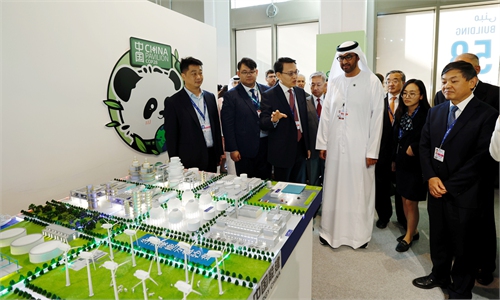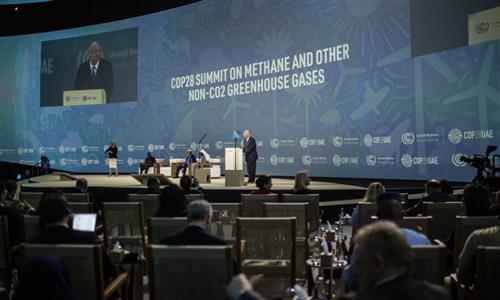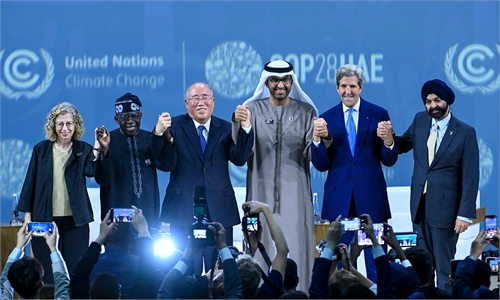Green transition via market forces raised as COP28 debates fossil fuel
China's progress in renewable energy impressive, 'offers a way forward'

A view of the Expo City Dubai, the venue of COP28 Photo: Shan Jie/GT
As countries clashed over a possible plan to phase out fossil fuels at the COP28 climate summit in Dubai amid challenging negotiations, experts on Monday suggested propelling the green energy transition through market forces rather than administrative power by focusing on cooperation to develop and promote cheap clean energy.
Whether fossil fuels should be phased out, and if so, at what pace, is one of the biggest topics of debate among participating parties at the COP28, the 28th meeting of the Conference of the Parties to the United Nations Framework Convention on Climate Change, which runs from November 30 to Tuesday and attracted more than 80,000 participants globally.
According to Reuters, while countries including the US, the EU and many climate-vulnerable nations are demanding that a COP28 deal call for an eventual end to fossil fuel use, OPEC+ countries rejected agreements that aimed to slash fossil fuel production and insisted that the conference focus only on reducing climate pollution.
China's special envoy for climate change Xie Zhenhua said on Saturday that without the fossil fuels agreement, there was not much chance of success at COP28, saying that a final agreement on fossil fuels at the United Nations COP28 summit was crucial - even if it's not perfect.
Asked about the choice of the words "phasing out" fossil fuels in the latest negotiating text, Xie said China was already consulting with other countries in order to find a solution. "We all want to work together to find a language that points in the right direction of further efforts and reflects inclusiveness to the utmost extent and is acceptable to all parties," he said, as quoted by Reuters.
As COP28 President Sultan Ahmed Al Jaber on Sunday called on countries to work harder, be flexible and accept compromise to reach a deal on tackling climate change, experts said that while some developed countries had individual plans to eliminate coal, it would be challenging to reach a fossil fuel phase-out deal globally.
They said that oil and gas producers will have no equal economic alternatives to compensate for the benefits brought by exporting fossil fuels once such a plan is implemented, and many developing countries prefer the cheaper fossil fuel energy for their economic development.
The focus of the COP28 discussions should not be on banning fossil fuels, but rather on how to better promote clean energy globally, because when people have sustained green energy cheaper than coal and oil, they will naturally abandon the latter and market forces will help complete the energy transition, Pan Jiahua, director of the institute of eco-civilization studies of the Beijing University of Technology, told the Global Times on Monday.
As an example, Pan pointed to the current momentum of electric vehicles replacing petrol ones in China, saying this kind of replacement not only mitigates the oil crisis and reduces emissions, but can also help improve people's livelihood by increasing employment and enabling more middle-and-low income families to have a car with lower usage costs.
The market penetration rate of new energy vehicles in China will reach 45 percent and 60 percent respectively in 2025 and 2030, and by 2030, China's automotive industry will have established a complete carbon emission reduction management policy system, said a roadmap released by the China Society of Automotive Engineers and the China Automotive Technology Research Center in December.
"At the COP28 venue, I saw a large number of representatives from China. China's rapid progress in renewable energy has deeply impressed the foreign leaders participating the event, which has also boosted confidence in other countries," Ma Jun, director of the Beijing-based Institute of Public and Environmental Affairs, who is also attending COP28 in Dubai, told the Global Times.
In 2022, China's wind power and photovoltaic power generation capacity had reached 1.19 trillion kilowatt-hours, with a year-on-year growth of 21 percent. It accounts for 13.8 percent of the total electricity consumption and is close to the domestic consumption of urban and rural residents nationwide, according to the National Energy Administration.
China's renewable energy generation and its exports of wind and photovoltaic power products to other countries in 2022 is equivalent to reducing carbon dioxide emissions by about 2.83 billion tons, accounting for 41 percent of global renewable energy carbon reductions in 2022.



